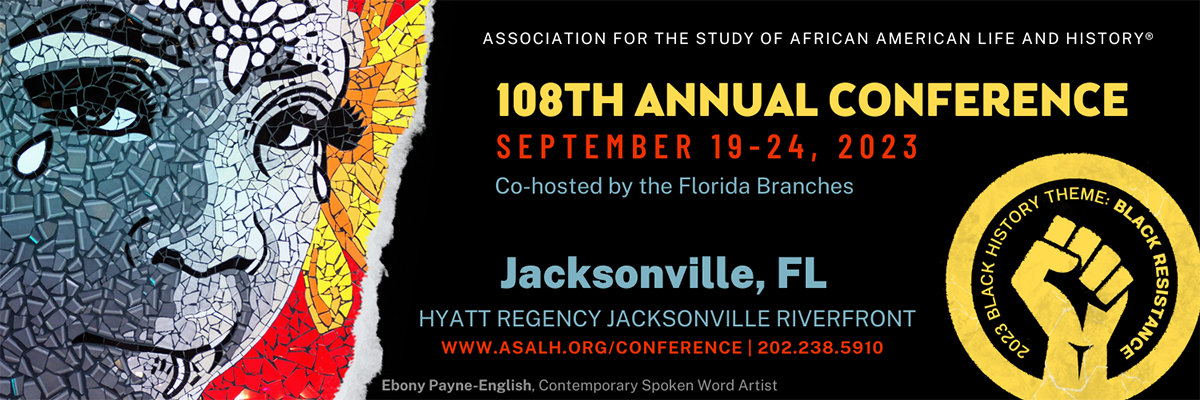So much history here in St. Augustine, Jacksonville and Florida. to the 108th Annual Conference of the Association for Study of African. American Life and History (ASALH):Welcome to Florida. We in the reality-based community here in Florida all salute you! Welcome to Florida. Be not afraid. (In Bible some 108 times)! Much to explore, Much to deplore. Explore this blog. Call me if I may help. From the website of the 108th Annual Conference of the Association for Study of African. American Life and History (ASALH):

Black Resistance
African Americans have resisted historic and ongoing oppression, in all forms, especially the racial terrorism of lynching, racial pogroms, and police killings since our arrival upon these shores. These efforts have been to advocate for a dignified self-determined life in a just democratic society in the United States and beyond the United States political jurisdiction. During the 1950s and 1970s the United States was defined by actions such as sit-ins, boycotts, walk outs, strikes by Black people and white allies in the fight for justice against discrimination in all sectors of society from employment to education to housing. Black people have had to consistently push the United States to live up to its ideals of freedom, liberty, and justice for all. Black people also have sought ways to nurture and protect Black lives, and for autonomy of their physical and intellectual bodies through armed resistance, voluntary emigration, nonviolence, education, music, literature, sports, media, and legislation/politics.
Black-led institutions and affiliations have lobbied, litigated, legislated, protested, and achieved success. In an effort to live, maintain, and protect economic success Black people have organized/planned violent insurrections against those who enslaved them, or choose to self-liberate as seen by the actions those who left the plantation system. Black people established faith institutions to organize resistance efforts; and it was a space that inspired folk to participate in the movements and offered sanctuary during times of crisis.
To promote awareness of the myriad of issues and activities media outlets were developed including radio shows, podcasts, and newspapers. Additionally, Black people created and built cultural centers such as libraries, fraternal and sororal orders/organizations, associations were founded to support the intellectual development of communities to collect and preserve Black stories, sponsor Black history and literature events, and were active in the quest for civil, social, and human rights. Black medical professionals worked with others to establish nursing schools, hospitals, and clinics to provide spaces for Black people to get quality health care. Similarly, whether in elementary, secondary, or higher education institutions, education has been used as a way for Black people and communities to resist the narrative that Black people are intellectually inferior. When Carter G. Woodson founded Negro History Week (NHW) in 1926, he saw it as to provide a space and resources to educate critically students about their history. As a result, students at all levels of education were at the forefront of the Civil Rights Movement, Black Power Movements, and social justice movements from the nineteenth to twenty-first centuries. Often African Americans used African American spirituals, gospel, folk music, hip-hop, and rap have been used to express struggle, hope, and for solidarity in the face of racial oppression. In general, the arts have been used to counter stereotypes, to imagine a present and future with Black people in, to illustrate societal issues including white and state sanctioned violence, sexual politics, as motivation, for strength against harassment, and to experience freedom. Unfortunately, when Black athletic activists have spoken up they suffer personal and economic consequences due to their stances, speech, and actions, but to them it has been worth it to see changes.
Nearly 179 years ago, the Rev. Henry Highland Garnett proposed that the only path to freedom, justice, and equality; self-determination; and/or social transformation is resistance. In thunder tones, Garnett shouted, “Let your motto be resistance! resistance! RESISTANCE!” By resisting Black people have achieved triumphs, successes, and progress as seen in the end of chattel slavery, dismantling of Jim and Jane Crow segregation in the South, increased political representation at all levels of government, desegregation of educational institutions, the passage of Civil Rights Act of 1964, the opening of the Smithsonian National Museum of African American History in DC and increased and diverse representation of Black experiences in media. Black resistance strategies have served as a model for every other social movement in the country, thus, the legacy and importance of these actions cannot be understated.
This is a call to everyone, inside and outside the academy, to study the history of Black Americans’ responses to establish safe spaces, where Black life can be sustained, fortified, and respected.
No comments:
Post a Comment